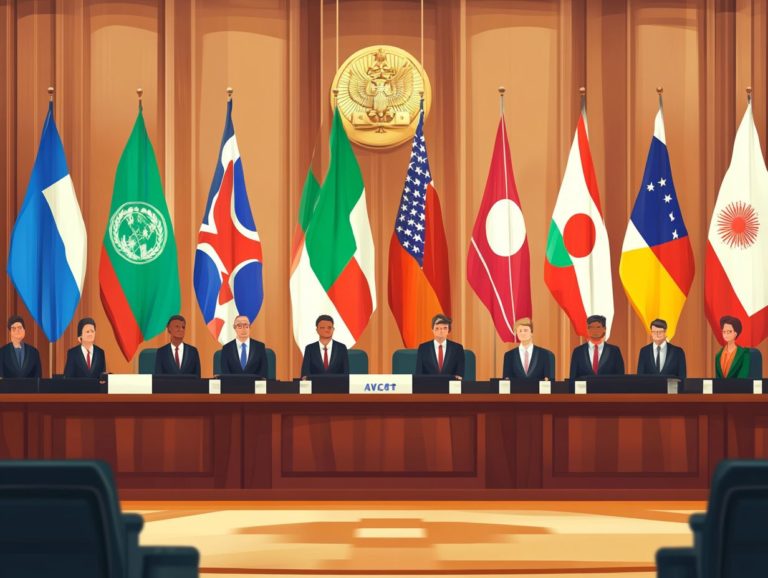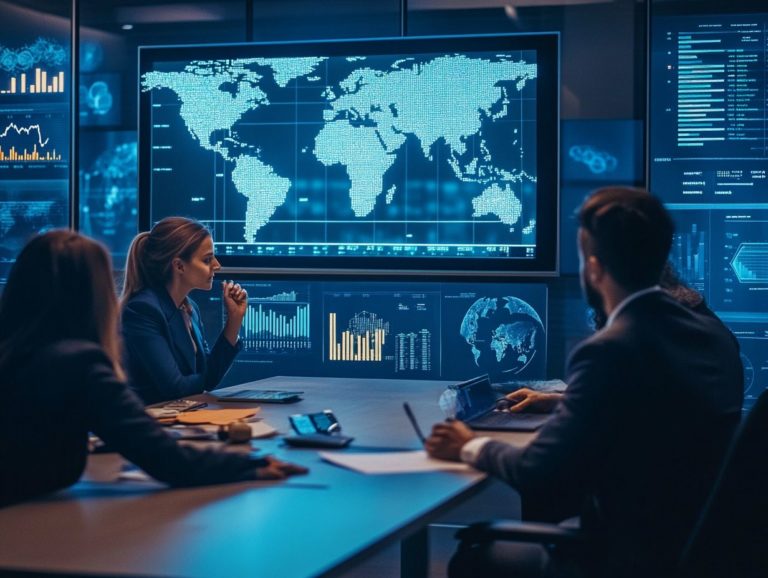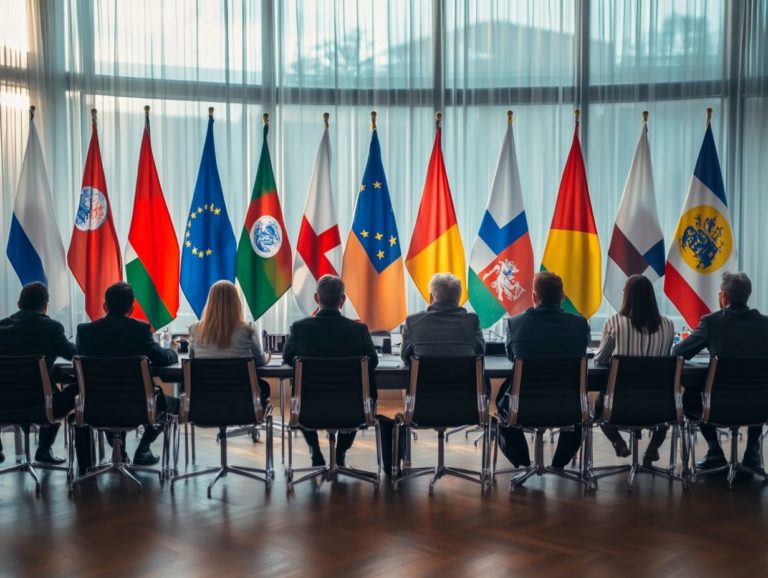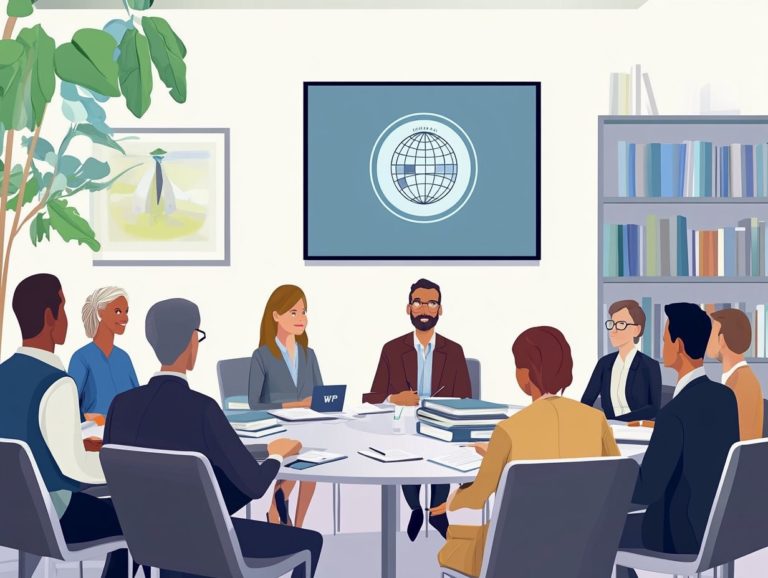The Future of Copyright in an International Context
Copyright serves as a vital shield for creators’ rights worldwide. However, you may find navigating its intricacies particularly challenging, especially on an international scale.
As digital technology evolves and the world becomes more interconnected, issues such as enforcement, piracy, and ongoing debates surrounding fair use have taken center stage.
This article delves into the current landscape of international copyright laws, the influence of organizations like WIPO, and emerging strategies for safeguarding intellectual property in this digital era.
Engage with us as we explore the future of copyright and underscore the essential need for collaboration in upholding creative rights across the globe.
Contents
- Key Takeaways:
- The Importance of Copyright on an International Scale
- Current Challenges in International Copyright
- The Role of International Organizations in Copyright Regulation
- Potential Future Developments in International Copyright
- Protecting Copyright in the Digital Age
- Collaboration and Cooperation in International Copyright
- Frequently Asked Questions
- 1. What is the current state of copyright in an international context?
- 2. How is technology affecting the future of copyright?
- 3. What are some key challenges facing copyright in the future?
- 4. What role do international agreements play in copyright?
- 5. How can copyright laws adapt to the digital landscape?
- 6. What can individuals and businesses do regarding copyright?
Key Takeaways:

International copyright laws are crucial in protecting intellectual property and promoting creativity globally. Challenges such as piracy and debates on fair use and duration of copyright require international cooperation for effective solutions. For a deeper insight, understanding copyright in international contexts will be vital as the future of copyright is shaped by technological advancements and the effects of globalization. Collaboration among countries is essential.
The Importance of Copyright on an International Scale
In today’s increasingly interconnected world, the significance of copyright is crucial. It safeguards the creative works of content producers and ensures equitable access rights, fostering the public good by promoting innovation and cultural exchange across borders.
Copyright law acts as an important system, giving power to young individuals and creators from emerging economies to flourish as they navigate a constantly evolving copyright landscape shaped by digital technologies and social media platforms.
Understanding Copyright Laws and Their Impact
Understanding copyright laws is crucial for navigating the intricate landscape of copyright issues. These laws lay the legal groundwork for protecting creative works while addressing vital concerns like digital piracy and fair use.
Not only do these laws safeguard the rights of content producers, but they also significantly shape how you access and engage with information. Striking a balance between protecting intellectual property and ensuring that you can freely access knowledge is a challenge that policymakers grapple with worldwide.
When copyright enforcement becomes overly stringent, it can create barriers for consumers, potentially stifling innovation and limiting creativity. If protections are too lax, it may diminish the incentives for artists and creators to invest their time and resources into their work.
Therefore, grasping these dynamics is essential for cultivating a vibrant ecosystem that benefits both creators and users like you.
Current Challenges in International Copyright
The current challenges in international copyright reveal pressing issues stemming from digital piracy and varying enforcement mechanisms. These complexities hinder effective copyright regulation and significantly influence media policy on a global scale.
Issues with Enforcement and Piracy
Issues surrounding enforcement and piracy are front and center in today s copyright landscape. Copyright infringement poses significant threats to content producers and creative industries, highlighting our urgent need for implementing technical measures and robust copyright laws to address these challenges.
For example, the music industry is perpetually engaged in a battle against unauthorized distribution and file-sharing, which erodes revenue streams and artist royalties. Similarly, journalists grapple with content theft, as their carefully crafted articles are often reproduced without permission, severely impacting both their reputation and income.
Effective enforcement mechanisms such as a tool that helps protect digital content from unauthorized use, automatic content recognition systems, and international treaties play crucial roles in this ongoing struggle. Strong copyright protection safeguards the livelihoods of creators and cultivates an environment where innovation and creativity can flourish.
Debates on Fair Use and Copyright Duration
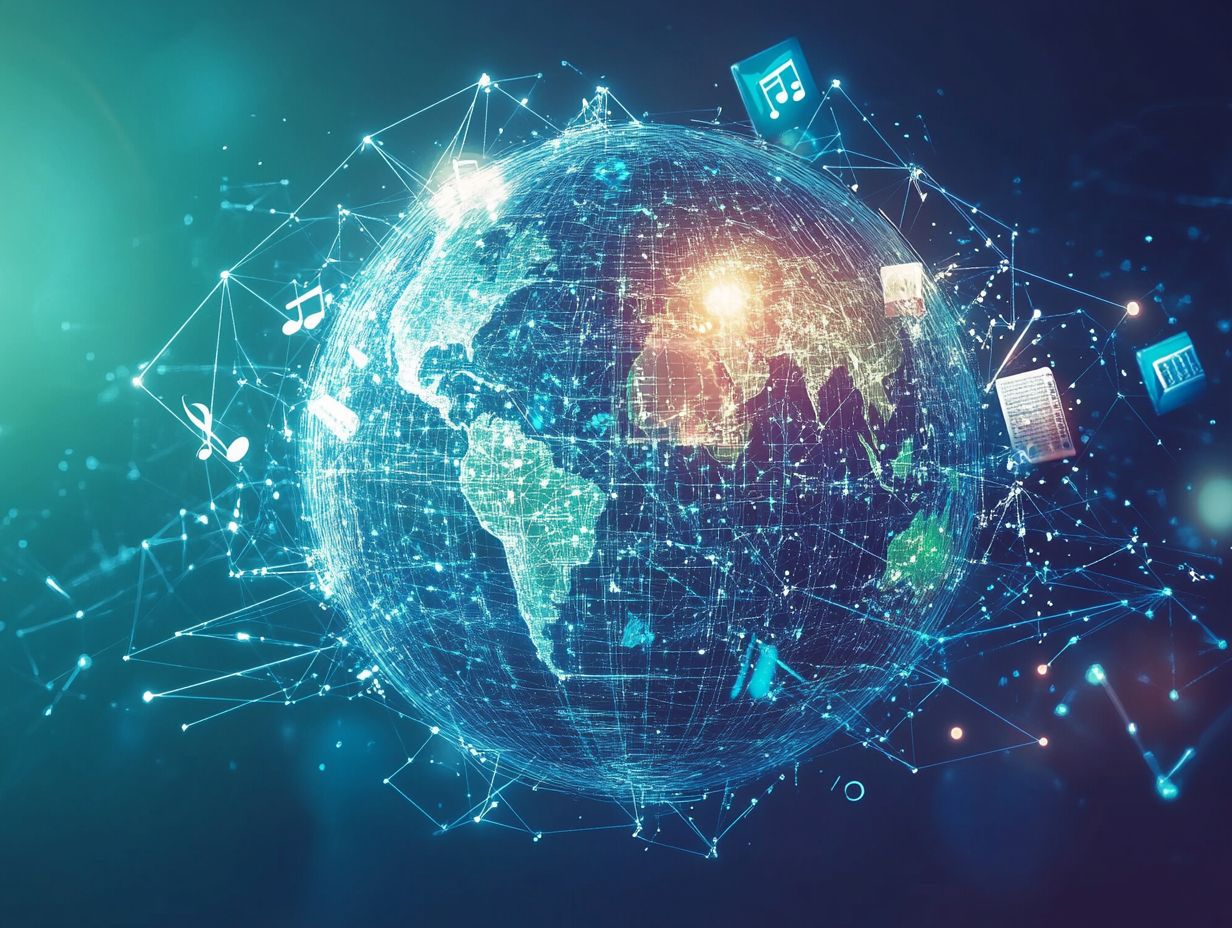
Debates surrounding fair use and copyright duration sit at the heart of copyright reform discussions, aiming to strike a balance between the interests of content creators and consumers while ensuring equitable access to information.
Consider the educational landscape: having the ability to utilize copyrighted materials without excessive constraints can significantly enrich learning experiences. However, this freedom raises valid concerns among creators about potential misuse.
In the realm of journalism, fair use serves as a critical tool for reporting. It gives journalists the power to quote, critique, and provide context for public discourse without stepping on the toes of original works.
Yet, adjusting copyright duration creates more challenges. Extending protections too long might hinder innovation and accessibility, while overly short durations could jeopardize the rights of creators.
These dynamics become even more intricate when you factor in international intellectual property rights regimes, which often differ in their interpretations and enforcement of copyright laws. This variation influences the ongoing debate over what fair use truly means across diverse jurisdictions.
The Role of International Organizations in Copyright Regulation
International organizations like WIPO are essential in the realm of copyright regulation. They set the standards and frameworks necessary for fostering cooperation between countries, ensuring a more harmonious approach to protecting creative works on a global scale. By promoting initiatives such as Creative Commons, they enhance accessibility and encourage a more inclusive creative landscape.
Efforts by WIPO and Other Organizations
WIPO’s tireless efforts in advancing copyright regulation through comprehensive agreements and initiatives have profoundly impacted the establishment of essential copyright protections for content creators worldwide. Initiatives such as the Berne Convention and the WIPO Copyright Treaty have not only set the stage for safeguarding creative works but have also skillfully adapted to the challenges posed by the digital age.
By fostering a collaborative environment among member states, WIPO plays a crucial role in shaping national media policies, ensuring that creators like you receive fair compensation for your work. The organization s ongoing dialogues and proposed reforms actively influence the copyright landscape, promoting coherence in international laws while giving artists the power to flourish within a balanced ecosystem.
Potential Future Developments in International Copyright
As you gaze into the future, it’s clear that potential developments in international copyright will be significantly influenced by technological advancements and globalization. This evolution will drive the necessity for copyright reform that effectively addresses the emerging challenges brought forth by generative AI and other digital technologies.
Technological Advancements and their Impact
Technological advancements, particularly in digital technologies and generative AI which is AI that can create new content, such as text, images, or music present unique copyright challenges that require you to rethink existing protections. As these innovations unfold, they increasingly blur the lines between original content and derivative works, complicating the enforcement of copyright laws.
As a content producer whether you re an artist, writer, or developer you now face the daunting task of ensuring your creations are safeguarded against unauthorized use. This landscape is increasingly populated with algorithmically generated material, making it all the more complex.
The shift not only disrupts traditional frameworks that protect creative works but also raises critical questions about ownership and attribution in an era where AI can closely mimic human creativity. For you as a consumer, the swift expansion of digital content brings exciting opportunities for discovery, but it also poses the risk of encountering infringing works. This dynamic is reshaping your role in the media ecosystem, prompting you to navigate a landscape where the lines of creativity and ownership are constantly evolving.
Effects of Globalization on Copyright
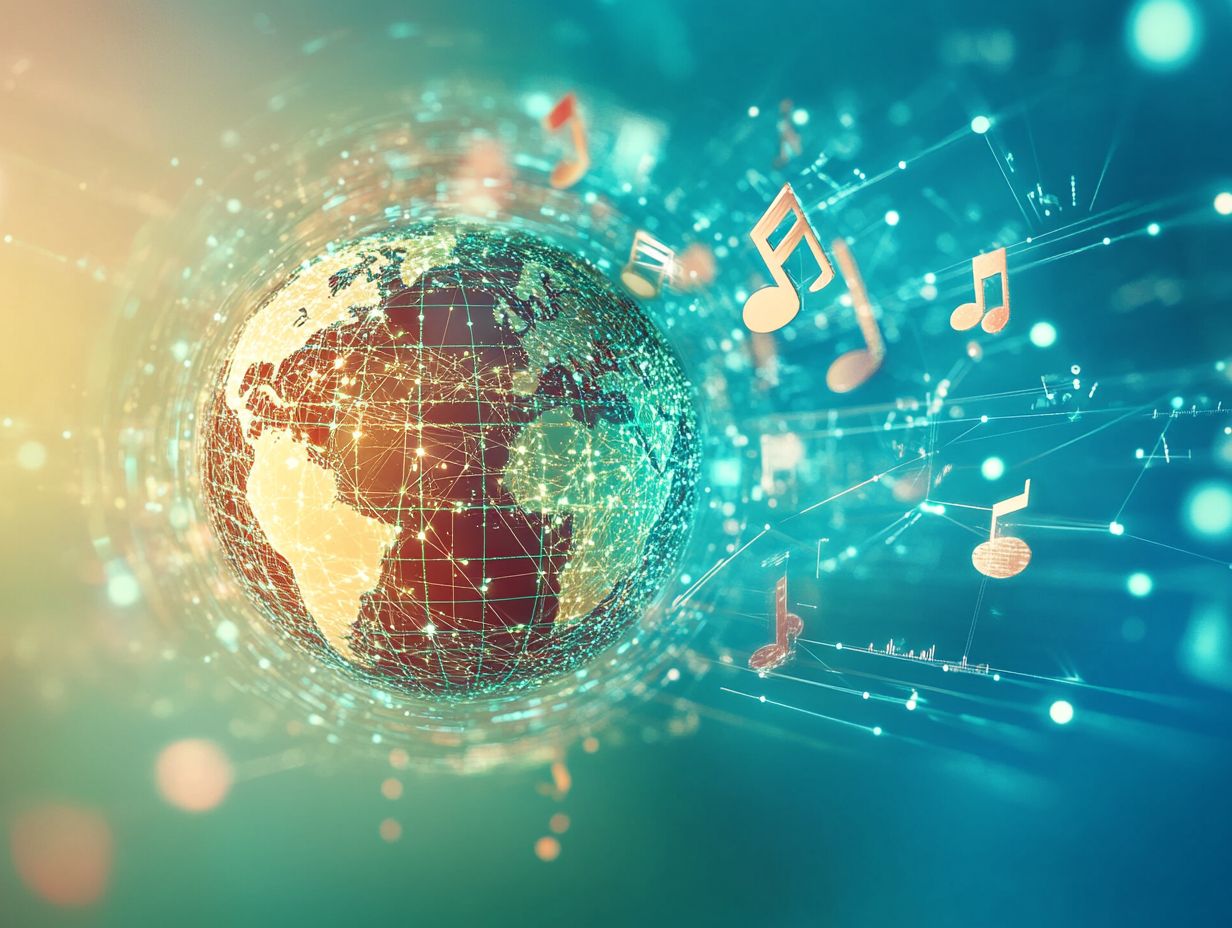
The effects of globalization on copyright are clear in the changing landscape of copyright, where international frameworks must evolve to ensure fair access rights and effective content distribution across borders.
This shift is largely driven by digital technologies and the internet, which have blurred geographical boundaries and transformed how content is created, shared, and consumed.
As a result, you may find yourself navigating a maze of complex international regulations alongside various stakeholders, including artists, manufacturers, and consumers.
Globalization offers vast opportunities to reach a global audience, enhancing your content’s visibility and potential revenue. However, disparities in copyright enforcement across different jurisdictions can create significant challenges, leading to inconsistencies in protection and increased piracy.
Therefore, international cooperation is essential to establish standardized practices that balance the rights of creators with the need for public access.
Protecting Copyright in the Digital Age
You need a strong strategy to protect your copyright in the digital age. This includes strong enforcement, advanced technical measures, and responsible online sharing practices.
By embracing these strategies, you can effectively safeguard your creative works from infringement and ensure that your intellectual property remains secure in a constantly changing digital landscape.
Strategies for Protecting Intellectual Property Online
Protecting your intellectual property online requires a thoughtful mix of copyright protections, digital licenses, and smart content aggregation techniques. This ensures you maintain control over your creations in a fluid digital world.
In this complex environment, it is crucial to be proactive, adopting tailored strategies to protect your original content. Implementing digital licenses clarifies the usage rights you grant to others, enabling effective monetization of your works.
When done right, content aggregation can lead audiences back to your original sources while respecting your rights as a creator. Establishing clear terms of use and monitoring unauthorized reproductions will further deter infringement.
By leveraging these strategies, you can secure your intellectual property while promoting a culture of respect and acknowledgment within the creative community.
Collaboration and Cooperation in International Copyright
Collaboration and cooperation in international copyright are vital for creating a harmonious framework that enhances effective copyright enforcement. This is particularly important for addressing the unique challenges faced by content producers, especially in emerging economies with developing copyright laws.
When we work together, we can create a strong system that boosts creativity and innovation across borders.
The Need for International Cooperation in Copyright Enforcement
The necessity for international cooperation in copyright enforcement is greater than ever in our interconnected world, where diverse media policies and varying access rights complicate effective enforcement. Understanding the future of patents in a digital world can also play a crucial role in addressing these challenges.
As creative works cross borders, the complexities of intellectual property rights highlight the need for strong global agreements and frameworks. Without unified efforts, countries may struggle to uphold their copyright standards, leaving creators vulnerable to infringement.
International organizations like the World Intellectual Property Organization (WIPO) and the United Nations Educational, Scientific and Cultural Organization (UNESCO) play crucial roles in fostering dialogue and collaboration among member states. Their initiatives focus on harmonizing laws and establishing guidelines, ultimately enhancing our collective ability to confront global copyright challenges.
Adopting a multifaceted approach is essential for protecting creators’ rights worldwide, promoting fair access to cultural content, and nurturing innovation across borders.
Frequently Asked Questions
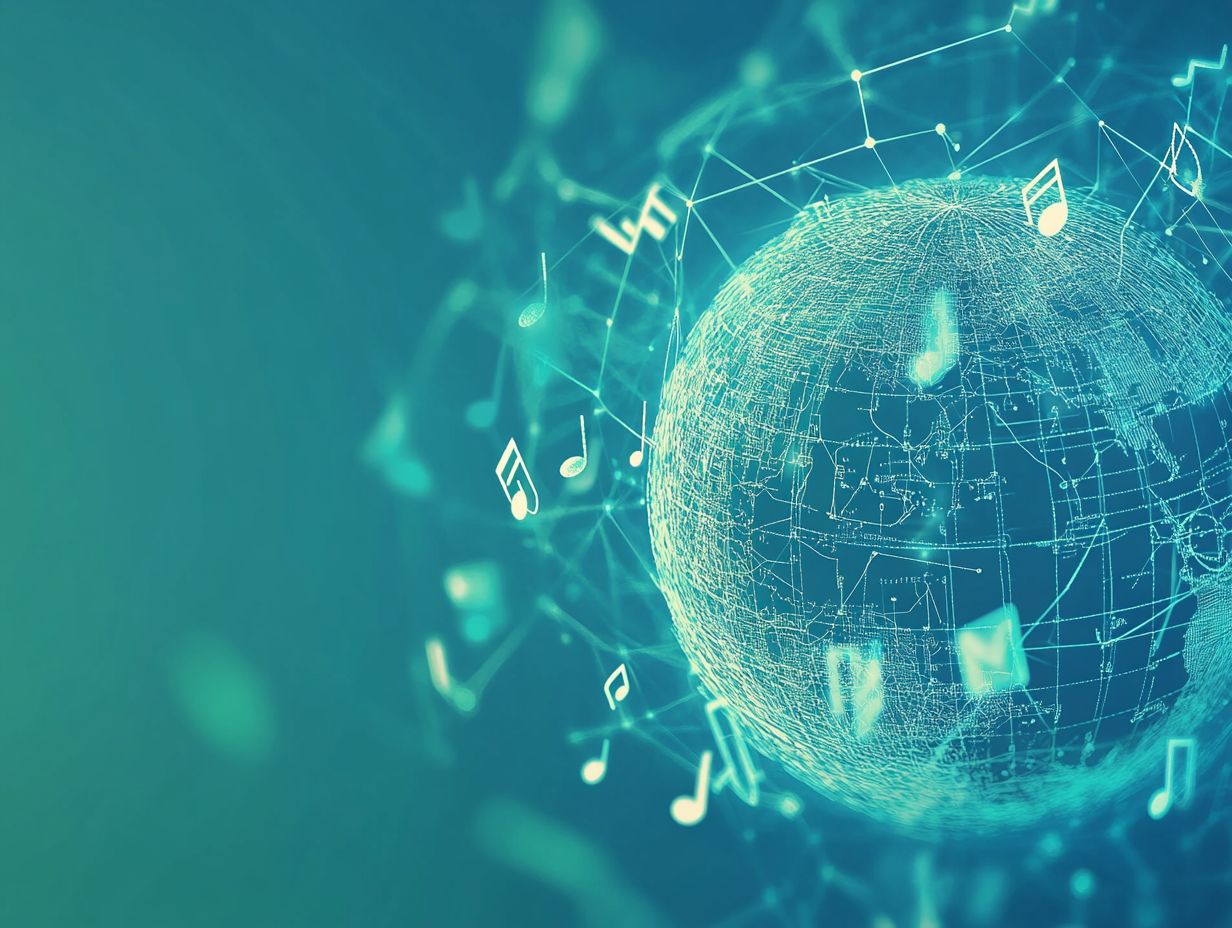
1. What is the current state of copyright in an international context?
The current state of copyright is complex and ever-changing. Digital technologies allow copyrighted material to be shared easily around the world.
2. How is technology affecting the future of copyright?
Technology greatly influences copyright’s future. It simplifies the distribution of content, making it harder for creators to protect their work.
3. What are some key challenges facing copyright in the future?
One challenge is balancing the rights of creators with public access. Another is the inconsistent copyright laws across countries, complicating enforcement.
4. What role do international agreements play in copyright?
Agreements like the Berne Convention set minimum copyright standards. They encourage cooperation among nations to tackle copyright issues.
5. How can copyright laws adapt to the digital landscape?
Copyright laws need regular updates to address changes in technology. This includes imposing stricter penalties for infringement and ensuring a fair balance between rights and access.
6. What can individuals and businesses do regarding copyright?
Stay informed about copyright laws in various countries. Obtain the right licenses for using copyrighted material and seek legal advice when needed.

